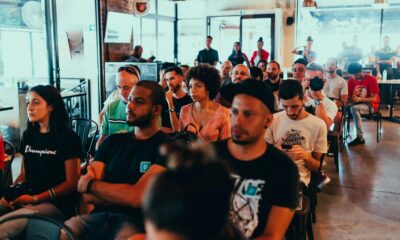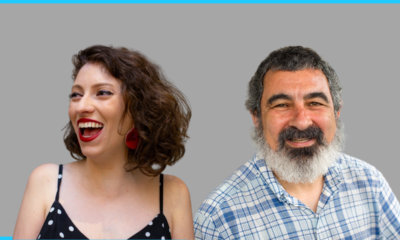Civic Science Observer
Brian Southwell shares insights for educators on how to help students navigate outside the classroom to get accurate information about science
On January 28, 2025, Dr. Brian Southwell (Distinguished Fellows at RTI International) delivered a presentation during a webinar titled “In Celebration of NOVA’s New Collection: Helping Students Spot Science Misinformation” hosted by GBH Education. The presentation focused on how educators can help students navigate the growing challenge of science misinformation. Below is a collection of insights from his remarks clustered around some of the key themes that emerged.
On asking the right questions
“How can we keep students safe from misinformation?”
“I worry that by simply focusing on this [science misinformation] as a threat, we are actually asking somewhat the wrong question.”
“I think the real question for us here tonight is, how is it that we actually might be able to build and maintain trust amongst different communities?”
On defining misinformation about science
“One of the most important pieces of this report is actually the definition of misinformation about science that the committee developed.” (referring to the 2024 report titled ‘Understanding and Addressing Misinformation About Science published by the National Academies of Science)
“Misinformation about science occurs when there are instances in which information asserts or implies claims that are inconsistent with the weight of accepted scientific evidence at the time.”
“That notion of the weight of accepted scientific evidence at the time is important because science itself is iterative. Science itself evolves, and it is possible that a claim from 1957 might be outdated today based on new evidence.”
“It’s really important, and the committee thought it was really important, to point out that which claims are determined to be misinformation about science can evolve over time as new evidence accumulates and as scientific knowledge regarding those claims advances.”
“We can’t just call everything we don’t like or everything that’s a matter of difference of opinion or values, misinformation. But in fact, we can point to a real, serious phenomenon that’s happening, and it’s where people are raising claims that really are at odds with the weight of evidence.”
On that misinformation about science isn’t new
“Something that we are facing at this moment is what seems to be a relatively sudden and emergent threat. But this has been a challenge that has been with us for a long time, as we’ve dealt with both students and greater publics, and as we think about the translation of science.”
“If I were to call any one of you a snake-oil salesperson or snake-oil salesman, you’d be offended by that. I mean, be offended by that because it’s a real turn of phrase. It has meaning in our colloquial language, but it actually is also something that’s rooted in a real historical set of incidents in which there was concern about the fraudulent promotion of snake oil in different medicines.”
“The word science itself has been used by organizations at times, in ways that now, looking back historically, we recognize that it was not really a matter of people using the best available evidence that they had, even at the time. You certainly saw this in the case of claims that were advanced in the name of eugenics.”
On the role of trust in combating misinformation
“I think we need to spend a little bit less time worrying solely about blaming—those that are misled, those that don’t trust us, those that are, frankly, perhaps putting false information out into the environment.”
“We need to approach this with some humility, to suggest that misinformation about science really is a problem and a challenge for us, but it’s also something that we need to define in a particular way.
“Building trust is a long-term project. It requires consistency, transparency, and a willingness to acknowledge when science has made mistakes.”
On how educators can respond
“Ultimately, our way through this is going to be a matter of instilling, encouraging, building, and maintaining trust. Sources like PBS LearningMedia certainly can aid in that.”
“We know that we can correct misinformation, but doing so is hard. You have to do so with the same level of exposure as the original piece of problematic information.”
“The fact that students are coming to you with questions is a good thing. It’s a sign of a good and healthy relationship.”
“If you are going to correct misinformation, you need to be explicit in doing that, but try to do so in a way that’s not alienating, shaming, or blaming. You’ve got to get people to come back in from out of the cold here, back in the community.”
“Teaching people how science operates is really vital. If you get one takeaway here, it’s recognizing that your effort to teach the process of science, as opposed to just science facts, is probably the single best step you can take in helping us collectively deal with misinformation.”
“Finding ways to have real and open and honest discussions without necessarily just accepting at face value a particular claim can be important. I just think that that approach can sometimes really help quite a bit to turn down the temperature a little.”
“It’s important to give students a sense of agency in evaluating information. When they feel like they have the skills to assess claims themselves, they’re less likely to fall for misinformation.”
[On relevant case studies] “There has been a lot of work around the country. For example, a coalition in Maine, which has also collaborated with groups in Louisiana and other states, has focused on climate science. In those instances, students are encouraged to make observations about natural areas and explore what those observations suggest about our climate. Getting students engaged in asking questions is absolutely vital. Often, students ask questions that extend beyond their textbooks. For example, if they ask about the effects of artificial intelligence—even if we’re still gathering evidence—it’s a legitimate question that can lead to designing experiments and exploring new ideas.”
Share your key takeaways from the webinar in the comments below.
Fanuel Muindi is a former neuroscientist turned civic science ethnographer. He is a professor of the practice in the Department of Communication Studies within the College of Arts, Media, and Design at Northeastern University, where he leads the Civic Science Media Lab. Dr. Muindi received his Bachelor’s degree in Biology and PhD in Organismal Biology from Morehouse College and Stanford University, respectively. He completed his postdoctoral training at MIT.

-
 Audio Studio1 month ago
Audio Studio1 month ago“Reading it opened up a whole new world.” Kim Steele on building her company ‘Documentaries Don’t Work’
-
Civic Science Observer1 week ago
‘Science policy’ Google searches spiked in 2025. What does that mean?
-
Civic Science Observer1 month ago
Our developing civic science photojournalism experiment: Photos from 2025
-
Civic Science Observer1 month ago
Together again: Day 1 of the 2025 ASTC conference in black and white
Contact
Menu
Designed with WordPress
























